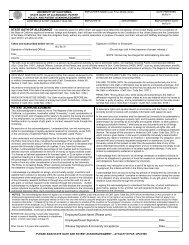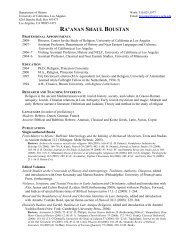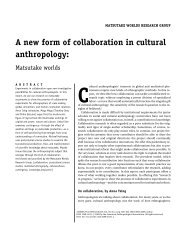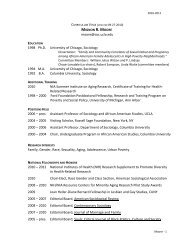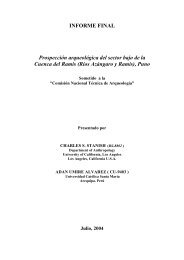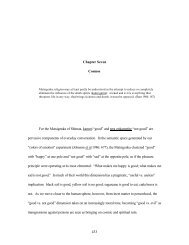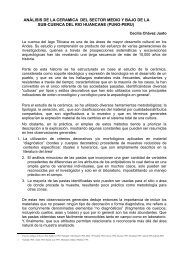The Long-Term Effects of Africa's Slave Trades - Social Sciences ...
The Long-Term Effects of Africa's Slave Trades - Social Sciences ...
The Long-Term Effects of Africa's Slave Trades - Social Sciences ...
Create successful ePaper yourself
Turn your PDF publications into a flip-book with our unique Google optimized e-Paper software.
that prevails today. 9<br />
2.2.3 Deterioration <strong>of</strong> Legal Institutions<br />
<strong>The</strong> slave trades also had a direct effect on legal institutions. An alternative<br />
way to obtain slaves was by falsely accusing others <strong>of</strong> witchcraft or<br />
other crimes. According to samples <strong>of</strong> slaves from Lovejoy (2000), Northrup<br />
(1978), and Koelle (1854), 4, 11, and 17% <strong>of</strong> the slaves entered slavery in<br />
this manner. Klein (2001, p. 59) writes that “communities began enslaving<br />
their own. Judicial penalties that formerly had taken the form <strong>of</strong> beatings,<br />
payment <strong>of</strong> compensation or exile, for example, were now converted<br />
to enslavement.” In many cases, leaders themselves supported or instigated<br />
this abuse <strong>of</strong> the judicial system (Mahadi, 1992; Klein, 2001). To protect<br />
themselves and their community, leaders <strong>of</strong>ten chose to pay tribute to avoid<br />
being raided by other communities. <strong>The</strong> slaves needed for tribute were <strong>of</strong>ten<br />
obtained through the judicial system. Hawthorne (1999, 2003) provides<br />
detailed studies <strong>of</strong> this process among the Cassanga <strong>of</strong> modern day Guinea<br />
Bissau. <strong>The</strong> chief <strong>of</strong> the Cassanga used the ‘red water ordeal’ to procure<br />
slaves and their possessions. Those accused <strong>of</strong> a crime were forced to drink<br />
a poisonous red liquid. If they vomited, then they were judged to be guilty.<br />
If they did not vomit, they were deemed not guilty. However, for those that<br />
did not vomit this usually brought death by poisoning, and their possessions<br />
were then seized, including all family members and relatives, who were then<br />
sold into slavery.<br />
<strong>The</strong> detrimental effects <strong>of</strong> the slave trades on the judicial system may<br />
be important for current development if previous experience developing and<br />
maintaining a well-functioning judicial system is helpful for implementing<br />
and sustaining legal institutions after independence. This may in turn be<br />
critical for development given the importance <strong>of</strong> domestic institutions for<br />
economic development (e.g., Acemoglu et al., 2001, 2002; Acemoglu and<br />
Johnson, 2004).<br />
<strong>The</strong> fact that the consequences <strong>of</strong> the slave trades may operate through<br />
multiple channels, particularly domestic institutions and ethnic fractionalization,<br />
is important. This is because recent research by Easterly (2001) and<br />
Miguel (2004) shows that strong domestic institutions and nation building<br />
policies can reduce the detrimental consequences <strong>of</strong> ethnic fractionalization.<br />
If the slave trades not only resulted in increased ethnic fractionalization,<br />
but also in weak states with poor domestic institutions and policies, then<br />
9 See Gellner (1983) for a description <strong>of</strong> the relationship between centralized states and<br />
the creation <strong>of</strong> a common national culture or identity.<br />
9




